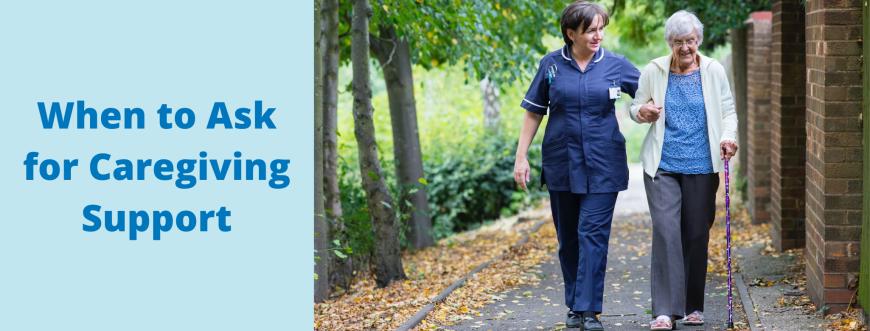


It can be difficult to know when it’s time to get additional support for your loved one. Emotional, financial, and logistical problems often arise around the issue of when and how to find caregiving support outside of the family. There are, however, some very clear warning signs that, no matter how difficult the decision may be, show that it is time to ask for help caring for your loved one:
A disheveled home
Clutter, unopened mail, or a drastic change in the way that your loved one takes care of their home can be a sign that they are having trouble completing everyday tasks.
Confusion or forgetfulness
Unfortunately, these symptoms can lead to missed medications, which can result in more serious health problems.
Extreme sadness or loneliness
Drastic mood swings are also not uncommon as people age, but addressing these feelings can be an important process as your loved one ages.
Poor personal hygiene
A significant change in your loved one’s appearance, such as wearing the same clothes for multiple days in a row or not bathing, is a sign that they may need caregiving assistance.
Extreme weight loss
Weight loss can happen for a multitude of reasons, but when an elderly person loses a significant amount of weight, it is important to get them to a medical professional for a check up.
Dangerous driving
This behavior is a safety hazard for your loved one and others on the road, so if you notice unsafe driving habits it is time to consider alternative transportation.
If you notice any of the aforementioned signs in an aging family member, it may be time to ask for help. You can reach out to their medical provider for recommendations, or look into the resources and non-profits listed at the end of this post. We know the decision to seek out additional caregiving assistance can be difficult and costly. Our team works hard to provide our customers with the equipment they need to age at home instead of having to go to an assisted living community or a nursing home, but we also realize that a facility setting may be necessary for some seniors. If you are caring for a loved one at home it is important to understand that you are not alone, and that there are resources to help you with whatever path you choose to take.


What is Caregiver Burnout?
Asking for help is important for your aging family members, but also for yourself. If you are a caregiver it is important to be able to recognize the symptoms of caregiver burnout. While we all want to be there to support our family members, if we are unhealthy or struggling with problems of our own we cannot always provide them with the best care. Caregiver burnout is a common occurrence in people who volunteer as caregivers for their family members. According to Cleveland Clinic, caregiver burnout is defined as “a state of physical, emotional and mental exhaustion. It may be accompanied by a change in attitude, from positive and caring to negative and unconcerned. Burnout can occur when caregivers don't get the help they need, or if they try to do more than they are able, physically or financially.” It is important to understand if you are experiencing caregiver burnout so that you do not compromise your own health for the sake of another’s. The most common symptoms of caregiver burnout are:
- Withdrawing from friends and family
- Losing interest in hobbies
- Feeling sad, overwhelmed, hopeless, or helpless
- Experiencing changes in appetite or weight
- Experiencing difficulty sleeping
- Getting sick more frequently than normal
- Feeling exhausted, irritable, or violent
While there is no magical cure to caregiver burnout, there are ways to maintain a healthy lifestyle while caring for a loved one. Here are some helpful ways to prevent caregiver burnout:
- Talk about your caregiving experience with a loved one or trusted friend
- Set realistic goals for yourself and ask for help when you need it
- Take exceptional care of yourself - you cannot help others if you do not help yourself
- Speak with a professional about your role as a caregiver and how it affects your life
- Know your limits and allow yourself to say no
- Stay healthy - this includes getting enough sleep, exercising regularly, and eating well
- Educate yourself about caregiver burnout and join a caregiving support group


Where to Go for Help
We’ve compiled a list of national non-profits and other groups that work to provide care and caregiving resources. Your local community is sure to have even more options for care, so reaching out to local groups is another great place to start. Remember, you are not alone. Close to 66 million Americans serve as caregivers for their family members. Caring for a loved one is a selfless and heroic act, but it’s important to remember that there is always help.
Elder Care Locator
The US Administration on Aging has created this user-friendly site for people to be able to easily search for local agencies and community-based services for seniors and caregivers
Caregiver.org
This website is an incredible resource for caregivers and seniors alike. Caregiver.org features guides on aging, a searchable database of organizations that provide care, and more.
Next Step in Care
If you want to learn more about making the transition between home care and a facility setting, this website has everything you need. Their useful guides will explain in detail how to organize a seamless transition for you and your loved one.
Caregiver Action Network
CAN works to improve the lives of caregivers by providing helpful resources, peer support, and educational tools.
AARP
The AARP offers resources specifically tailored to family caregivers. From legal and financial advice to help with finding a balance in your life as a caregiver, this site offers many resources.
Caring.com
This easy-to-use website has many helpful resources for caregivers, as well as a searchable database of senior care and senior living options.
We hope this post has been helpful and informative. If you need assistance in finding the right medical equipment for your loved one aging at home, please feel free to reach out to our procuct experts at 1-888-260-4430.
Do you enjoy reading the Med Mart blog? Follow us on Facebook to see all of our latest blogs, newest products, and exclusive promotions!